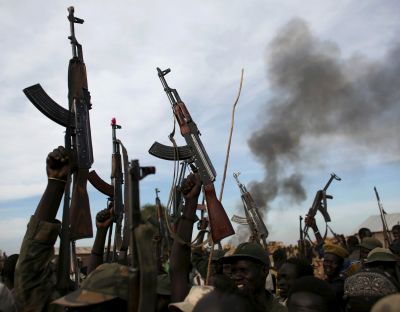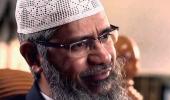Arun Kumar is at home after his dramatic escape from violence-hit South Sudan.
But he is preparing his return to his business, his life, his 'everything.'
Rediff.com's Shobha Warrier reports.

He has returned from "hell," but 33-year-old Arun Kumar, who was airlifted from South Sudan as part of Operation Sankat Mochan, is ready to go back in a week's time.
He has been visiting the homes of his employees in Kerala, telling them that the situation in violence-hit South Sudan is under control and normalcy is returning to the country.
Arun Kumar tells Rediff.com's Shobha Warrier how he reached South Sudan, how he built his business, what happened in the last week where they were surrounded by gunfire and why only 150 Indians decided to come home and the others chose to stay back.

More than 300 people were killed when clashes broke out on South Sudan's fifth Independence Day between troops loyal to Salva Kiir, the president, and soldiers who support the vice-president, Riek Machar.
Reacting the violence, India launched Operation Sankat Mochan to bring back its stranded citizens. Two C-17 Globemaster Indian Air Force aircraft were sent in to airlift those wishing a safe passage home.
"After completing my diploma in air conditioning, I started working for a company in Kenya that was in the business of selling and installing air conditioners. Soon, as part of my job, I was sent to South Sudan following which I returned to India.
In 2005, I returned to South Sudan and began my own company dealing with Samsung and Toshiba carriers. I initially took around three, four technicians with me.
In 2011, South Sudan gained independence from Sudan and Juba became its capital. Though my main office is in Juba, I have projects in 23 states across the country. We have done many big projects like the airport, the president's palace, the parliament and several ministers' bungalows.
After independence, the economy witnessed a boom and I received several projects owing to which I hired many more technicians from India.
As of date, I employ 32 Indians and 40 locals.
On July 9, 2016 -- the fifth anniversary of South Sudan's independence -- heavy gunfire and shelling erupted in front of the presidential palace, as well as in the north, close to the airport and near a major United Nations base.
The next three days we couldn't take a step out of our homes, as there was heavy firing and shelling. In fact, the bombs fell very close to our office building.
I must say that very few civilians were harmed; the fighting was between two tribal factions. However, the atmosphere was frightening for all of us. And even though we weren't harmed, the scenes were reminiscent of the terror and bloodshed in 2013 when civil war broke out in the area and thousands of people lost their lives.
The fighting and shelling continued unabated for four days and those four days were pure hell. All the airports were closed and there was no way anyone could get out of the place.
People were scared and thought it was unsafe to continue to stay there. We had no idea how long the violence would last.
As one of the first Indian businessman there, I approached the Indian embassy and the non-resident Keralites affairs department in Thiruvananthapuram.
The unrest, thankfully, lasted only for four days. After that, the government was able to bring things under control. By the time our rescue mission was ready to go, it had become quite calm.

General V K Singh (retd), the minister of state for external affairs who was in charge of Operation Sankat Mochan, can be seen standing in the aisle, with his back to the camera. Photograph: @MEAIndia/Twitter
More than 600 people had initially wanted to return to India, but when they saw that the situation was under control, most of them backed out, and only 150 or so people wanted to come back.
Mostly those whose family members were extremely worried after seeing the news of civil unrest on TV, decided to come back.
I must applaud the Indian government for the kind of help they extended to us. If I was asked to rate them, I would give them not 100, but 200 marks for their efficiency.
Twelve of my employees wished to return, so I decided to accompany them. I have no plans to abandon my business, my life, my everything and stay here.
I have a business worth Rs 70 to 80 crore (Rs 700 million to Rs 800 million) that I cannot afford to abandon everything. Other than my air-conditioning business, I have also entered into real estate. I am in the process of building villas there.
I am in touch with my employees and friends in Juba all the time. They informed me that as most foreigners have left Juba, a lot of looting is taking place. So, several others like me are in a hurry to go back to their businesses.
I am returning to Juba next week. I am visiting the homes of my employees to assure their family members about their safety.
My local employees informed me that they have resumed work on July 18. I don't think there is anything to worry right now.
My workers told me that earlier work resembled a home where a death had taken place -- quiet and depressing. But now there is nothing to panic.
The problem is in India TV channels are playing it up and making it out to appear as a huge disaster. However, the truth is everything is getting back to normal."











 © 2025
© 2025